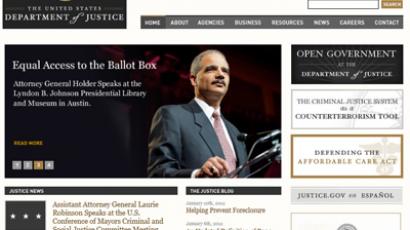Bill Killed: SOPA death celebrated as Congress recalls anti-piracy acts
A controversial American anti-piracy act was recalled on Friday, which came as no small victory for hacktivists who launched history's largest attack on several websites – including that of FBI – in protest of the Stop Online Piracy Act.
Those opposing the controversial law have grown jubilant, with many seeing Friday's news as real victory in a sort of war for online freedom. The vote on the anti-piracy legislation, which was due on January, 24, has been postponed. The words of House of Representatives Judiciary Committee Chairman Lamar Smith – who was the chief sponsor of SOPA – came as a bombshell: he stated that American legislators would delay action on similar proposals until the matter is more widely agreed upon. “I have heard from the critics, and I take seriously their concerns regarding proposed legislation to address the problem of online piracy,” Smith said. “It is clear that we need to revisit the approach on how best to address the problem of foreign thieves that steal and sell American inventions and products.” “The Committee will continue work with copyright owners, Internet companies, and financial institutions to develop proposals that combat online piracy and protect America’s intellectual property.”He said in a statement that the Judiciary Committee welcomes input “from all organizations and individuals who have an honest difference of opinion about how best to address this widespread problem.” Senate Democratic leader Harry Reid (D-NV) said that he decision was taken “in light of recent events.” “There is no reason that the legitimate issues raised by many about this bill cannot be resolved,” Reid said Friday morning in a prepared statement. While he condemned illegal activity on the Web, Senator Reid added that lawmakers will “continue engaging with all stakeholders to forge a balance between protecting Americans’ intellectual property, and maintaining openness and innovation on the Internet.” The bills – PIPA (PROTECT Internet Privacy Act) in the Senate and SOPA (Stop Online Piracy Act) – in the House, target access to overseas websites that provide pirated content and counterfeit products like movies and music.Hacker group Anonymous and its supporters celebrated after the bill's postponement was announced, writing “This is victory!” in their Twitter account following the statement by Lamar Smith. However, they cannot but realize that the fight is far from over. “A small battle has been won with the death of SOPA, but the war has just begun. PIPA & ACTA are still alive,” they wrote in their feed, reminding followers of one more significant abbreviation, for the Anti-Counterfeiting Trade Agreement. In October 2007, the United States, the European Community, Switzerland and Japan simultaneously announced that they would negotiate a new intellectual property enforcement treaty – the Anti-Counterfeiting Trade Agreement, or ACTA.
‘Bills could censor innocent users’
Trevor Timm of the Electronic Frontier Foundation, a US-based international digital rights advocacy non-profit, confirmed to RT that the online protests over SOPA and PIPA were the biggest in Internet history, with over 115 thousand sites somehow altering their webpages. “A lot of them blacked out completely, meaning that users couldn’t even get them – including Wikipedia, which is the sixth largest site in the US. This was a huge message to Congress.”Timm noted that many in the American public had not even heard about the bills before the blackout day, and once these sites blacked out, a multitude of people began calling and emailing their congressional representatives.“We had here at EFF sent over a million emails just in one day; Google got seven million signatures on their petition. By the end of the day, we had a huge swing in Congress where in the beginning of the day 60 congressmen supported the bill and 30 were against, and by the end of the day we had a hundred against.”The analyst called it a major victory for Internet freedom when within the next 24 hours, both houses of Congress agreed to shelve the bills indefinitely. And, as he says, the attacks and online protests turned the tables on legislation that, if passed, would have done little to tackle online piracy, but placed excessive restrictions on the average user.“The overall goal of these bills was to stop online piracy, but unfortunately the provisions were written so broadly that they would probably end up censoring millions of innocent users who never even thought of copyright infringement.” Timm adds that the bills' biggest flaw is that they wouldn't even stop online piracy since they don't go directly after site owners, but after everything around them. Domain names could be censored or delisted from search engines on government orders, while corporations would be allowed to cut payment processes and advertisers from these sites based only on allegations.“There was going to be broad immunity for Internet service providers to enforce these bills, so they could end up over-blocking sites and capturing innocent users,” the expert noted, adding that free speech would have been obstructed on a massive scale.
Do-nothing Congress trying to look busy – political cartoonist
Pulitzer Prize-winning political cartoonist Mark Fiore told RT that what Congress' postponement of the vote really shows, is that the attacks were a successful attempt to slow down the process – Congress can write a better bill. He also noted that the serious funding comes from groups like the Motion Picture Association of America, who have a major interest in keeping pirated material off the Web.He added that the end result he would like to see is a better – and smart bill. Fiore also pointed out that the bills were an attempt by Congress to demonstrate attention to economic problems, but he believes the state should address some more global issues affecting the situation:“The Congress in the US is largely a do-nothing Congress in the face of economic calamity, and this has really been their attempt to say: ‘Hey, we’re doing something about the economy: we’re going after all this online pirating,’ which is not really as big a problem as they are making it out to be. Yes, it’s terrible, but they would do a lot better if they went after off-shoring jobs and other things that really made a difference in the economy on a larger scale.”














